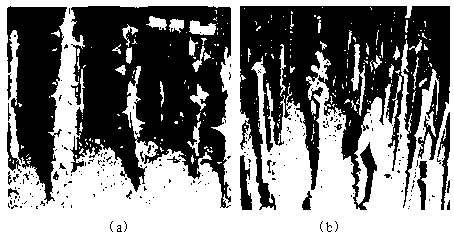Method for high-salt screening of saline-alkali resistant rosa chinensis plant
A salinity-tolerant, rose technology, applied in the fields of botanical equipment and methods, horticultural methods, plant regeneration, etc., can solve the problems of unsuitable rose growth and high soil salinity.
- Summary
- Abstract
- Description
- Claims
- Application Information
AI Technical Summary
Problems solved by technology
Method used
Image
Examples
Embodiment
[0044]Using Chinese roses as materials, the roses suitable for normal growth in saline-alkali land are selected through high-salt screening. The screening process is as follows:
[0045] (1) Preparation of Chinese rose explant cultivation medium
[0046] Vermiculite, perlite and nutrient soil are prepared in a mass ratio of 10:2:1, and 1 cm of river sand is laminated on the substrate, sterilized with 0.5% potassium permanganate aqueous solution, and then 0.3% rooting liquid Spray the substrate. Vermiculite and perlite are mainly for breathability and strong moisture retention, and provide a good growth condition for plants; press about 1 cm of river sand, mainly for fixation.
[0047] (2) Preparation of rose explants
[0048] Select thicker lignofibrous branches of vascular bundles, cut into stem segments of about 10 cm, and leave 2-3 leaves for each stem segment. Soak the morphological lower end of rose stems in 3% rooting solution for 1 hour, insert the cuttings into ...
PUM
 Login to View More
Login to View More Abstract
Description
Claims
Application Information
 Login to View More
Login to View More - R&D
- Intellectual Property
- Life Sciences
- Materials
- Tech Scout
- Unparalleled Data Quality
- Higher Quality Content
- 60% Fewer Hallucinations
Browse by: Latest US Patents, China's latest patents, Technical Efficacy Thesaurus, Application Domain, Technology Topic, Popular Technical Reports.
© 2025 PatSnap. All rights reserved.Legal|Privacy policy|Modern Slavery Act Transparency Statement|Sitemap|About US| Contact US: help@patsnap.com



